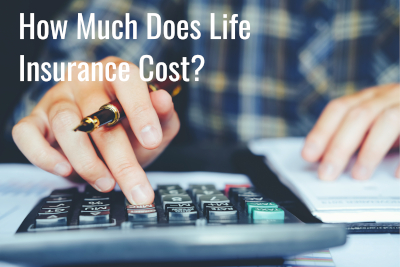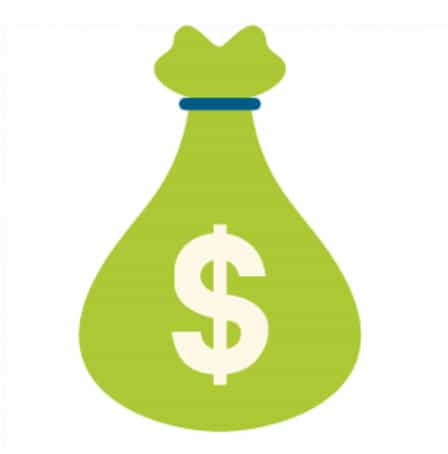How Much Does Life Insurance Cost?

Free Life Insurance Comparison
Compare Quotes From Top Companies and Save
Secured with SHA-256 Encryption
Aaron Englard
Insurance Premium Auditor
With over a decade of experience in insurance premium auditing, audit department management, and business audit representation, Aaron has developed a deep understanding of audit regulations, compliance requirements, and industry best practices. As the Founder & CEO of AdvoQates, he specializes in representing businesses during their audits to ensure accurate, transparent, and fair assessments ...
Insurance Premium Auditor
UPDATED: Feb 20, 2025
It’s all about you. We want to help you make the right coverage choices.
Advertiser Disclosure: We strive to help you make confident insurance decisions. Comparison shopping should be easy. We are not affiliated with any one insurance provider and cannot guarantee quotes from any single provider.
Our insurance industry partnerships don’t influence our content. Our opinions are our own. To compare quotes from many different insurance companies please enter your ZIP code on this page to use the free quote tool. The more quotes you compare, the more chances to save.
Editorial Guidelines: We are a free online resource for anyone interested in learning more about insurance. Our goal is to be an objective, third-party resource for everything insurance related. We update our site regularly, and all content is reviewed by insurance experts.
UPDATED: Feb 20, 2025
It’s all about you. We want to help you make the right coverage choices.
Advertiser Disclosure: We strive to help you make confident insurance decisions. Comparison shopping should be easy. We are not affiliated with any one insurance provider and cannot guarantee quotes from any single provider.
Our insurance industry partnerships don’t influence our content. Our opinions are our own. To compare quotes from many different insurance companies please enter your ZIP code on this page to use the free quote tool. The more quotes you compare, the more chances to save.
On This Page
Today I’m going to share some secrets other agents won’t reveal…Cutting the cost of life insurance!
Life insurance is a necessary evil that most people loathe to deal with, but it’s something everyone should buy to protect their family from the unthinkable.
However, it’s probably much more affordable than you think.
In fact, you might be surprised to hear that over 2 out of 3 people surveyed OVERESTIMATED the cost of life insurance.
So how do life insurers determine how much you pay for a policy, and what can you do to minimize your cost?
I will unravel the mystery that surrounds the cost of life insurance by analyzing the major factors that affect what you pay.
In this article:
- Life Insurance Costs Increase as You Age
- How Pre-Existing Conditions Affect Life Insurance Pricing
- 6 Tips for Reducing the Cost of Life Insurance
- How a Medical Exam Affects the Cost of Life Insurance
- Average Cost of Term vs. Whole Life Insurance
Life Insurance Cost Depends Largely on Your Age

One of the biggest factors that determine the cost of a life insurance policy is your age.
Why?
The reason is simple. At some point, everyone who is born will die. The average life expectancy in the U.S. today for both genders is 78.8 years of age. For males, the life expectancy is 76 while for females it is approximately 81.
Women are expected to live longer, so the rates they pay are less than what a male would pay.
Life insurance companies use complicated algorithms that factor in, not only your age but a whole host of other circumstances.
Premiums Increase as You Age
So how does age specifically affect your premium?
Every birthday puts you one year closer to your life expectancy and thus, you’re more expensive to insure,”…rates increase every year by 5% to 8% in your 40s, and by 9% to 12% each year if you’re over age 50.
In other words, as you age you get closer to the expected date of your mortality. Life insurance becomes more expensive as you grow older, for this reason alone.
The cost of a premium, for the most part, remains level from 18 – 30. There isn’t much difference in what you pay between the ages of 31 – 35.
After the age of 35, your premiums really start to increase and may escalate significantly with each passing year.
Buy Life Insurance When You’re Young and Healthy to Save Money
Look! You don’t want to spend more money than you have to on life insurance.
If you buy term life insurance, you will be investing money into a policy for at least 20 – 30 years. Buying life insurance when you are young WILL SAVE YOU A LOT OF MONEY.
The same applies to Permanent policies such as Universal or Whole Life.
Let’s take a quick look at an example of term insurance provided by the CNN Retirement Guide:
- Just as a ballpark, a healthy 35-year-old man who buys a 20-year level term policy, which has a fixed annual premium, might pay $430 a year to secure a $500,000 death benefit.
- A healthy 50-year-old man who buys the same policy might pay $1,300 a year.
- If he waits until he’s 65, the policy will cost about $7,300 a year.
This also applies to permanent life insurance policies. Premiums for cash-value policies are much higher.
- The healthy 35-year-old man who pays $430 a year for a $500,000 term policy would pay about $4,400 a year for a $500,000 universal life policy – in part because a portion of that $4,400 is going into the investment component of the policy.
That’s a huge difference.
Read more: 7 Reasons to Buy Life Insurance (Besides Replacing Income)
Think Long and Hard About the Term You Select
It’s very important to buy a term that is long enough or you could run into problems later in life.
If your policy expires during a period when you need coverage you could face a very steep increase in rates. Remember, you have grown older and the rate is based on your current age.
Bottom Line: Don’t Put Off Buying Life Insurance!
Read more: How does the insurance company determine my premium?
Enter your ZIP code below to view companies that have cheap insurance rates.
Secured with SHA-256 Encryption
How Pre-Existing Conditions Affect Life Insurance Costs
Another major factor that will impact the cost of your life insurance is the existence of pre-existing health conditions.
Keep in mind, your rate depends on the degree and severity of impairment.
Just because you have a pre-existing health issue doesn’t necessarily mean that life insurance will become unaffordable or you will be automatically declined.
Life insurance companies have adapted to medical advances and current treatments. Any medical condition which is under control and has a good prognosis may be treated leniently by the underwriter.
Survival rates for many illnesses are on the increase. Various types of cancer, HIV and numerous other diseases have seen a dramatic improvement in terms of treatment.
Many other medical conditions, which do not impact a person’s life span, can be expected to receive a “Standard” or better rating. This means that the cost of life insurance may still be very affordable.
The key is whether your medical condition is considered “stable.”
Fox Business addresses this issue in an article entitled Illness No Longer a Barrier to Life Insurance:
Such dramatic improvement in treatment outcomes means patients with a history of serious illness may qualify for standard life insurance rates — the same rates paid by people without pre-existing conditions — once their disease is under control.
You need to keep in mind that some insurers are much more liberal than others. This applies to their underwriting guidelines for certain medical conditions.
Key Issues that Impact the Cost of Life Insurance with a Pre-Existing Condition:
- Type of illness
- The severity of the medical condition
- When the condition was diagnosed
- How well the condition is controlled
- Method of treatment
Bottom Line: Don’t assume that you will be declined for a life insurance policy, or that the cost will be prohibitive because you have a pre-existing medical condition.
Tips for Reducing the Cost of Life Insurance
Another neat approach to save money on your life insurance premium is to be proactive.
There are some easy tricks you can use reduce the amount you pay.
We love helping people save money and are pleased to share our top tips with you:
1. Quit Smoking

All smokers, whether they use tobacco and/or marijuana products, are typically charged smoker’s rates.
Which translates into about a 25% increase in your premium.
That’s significant!
So, even if you have a policy now, or are about to apply for one, you should seriously think about giving up the smokes.
If you quit, after one year you can ask your insurer to reevaluate your policy. As a non smoker, you will benefit from a significant reduction in your premiums.
2. Improve Your Health

You might be experiencing medical issues involving high cholesterol, blood pressure or even type 2 diabetes if you are overweight and live a sedentary lifestyle.
Improving your diet, and partaking in an active and healthy lifestyle will reduce your weight and lower both your cholesterol and blood pressure.
Taking a more active approach to managing your health will significantly reduce the cost of your life insurance.
If these lifestyle changes have been implemented for one year, request a medical reevaluation from your insurer.
It’s likely you will obtain a better rating and lower premiums.
3. Don’t Buy More Life Insurance Than You Need

Don’t overestimate your life insurance needs. Buy only what is required in your particular circumstances. The bigger the policy – the higher the premium.
The same applies to the length of the term you choose. Why buy a 30 year term when a 20 or 25 year term covers the period you need.
Psst! Here’s another neat tip that many people don’t know about.
Life insurers are in fierce competition, so there are “sweet spots” for certain dollar figures of coverage such as $100,000, $250,000 and $500,000.
Buying slightly less life insurance may not be cheaper. Premium rates for certain levels of coverage often drop when you hit certain thresholds of coverage, so a $500,000 policy may cost less than a $490,000 policy.
4. Avoid Paying for Life Insurance Riders

Some agents will try to convince you to buy a life insurance rider, to give you additional protection.
In some instances, this might be prudent, such as you have a risky occupation, to consider extra protection such as a “Disability Income Rider” – but, in most cases, there is no need for insurance riders. They are costly and seldom required.
The only rider which you should consider is the “Term Conversion Rider” (available for term policies only).
This rider allows you to convert your term policy to a permanent policy without having to take a medical exam.
The conversion feature is beneficial because it allows you to continue coverage if your health deteriorates.
Most term policies sold today automatically include this conversion.
5. Pay Your Premiums Annually

Many people pay their premiums monthly.
This actually costs more money as the insurer charges administration fees on top of the premium to pay for processing your payment.
Choose to pay a single annual rate.
This will lower your premium because you will only be charged a single processing fee as opposed to 12 monthly fees.
6. Layer Your Term Policies

Instead of buying one large term policy to cover multiple purposes, you would be better off purchasing several policies for different amounts and varying term lengths.
For Example:
- One long term policy for income replacement
- Another shorter policy for your mortgage
- A shorter policy for your children’s college education
When you no longer need one of the policies for the purpose it was intended, you can cancel it. You will still have the others in place while lowering your overall premium cost.
How a Medical Exam Affects the Cost of Life Insurance
First off, let me clarify one thing – you are not responsible for paying for the medical exam required when applying for a life insurance policy. The cost of the exam itself is covered by the life insurer, whether you buy the policy or not.
As to how the medical exam itself affects the cost of life insurance – that’s an entirely different matter.
The purpose of the medical exam is to evaluate your overall health and determine your life expectancy. There are as many as 16 possible rate classes that you could be assigned when you apply for a policy. They test pretty much for everything, but overall the exam itself is relatively non-invasive. Most will check your height, weight, blood pressure and will likely require a blood and urine sample.
For older people, additional tests may be required such as an EKG or cognitive screening. If you haven’t had a physical examination for a while, it may uncover health issues which you might not have been aware of.
These tests reveal the overall state of your health and give insurers information about illicit drug and tobacco use.
The underwriter will review your application, along with the results of the medical exam. You will then be assigned a rate class based on your age and overall health. This will determine the premium you will be accessed.
Enter your ZIP code below to view companies that have cheap insurance rates.
Secured with SHA-256 Encryption
Average Cost of Term Life Insurance vs. Whole Life Insurance
There is a significant cost differential between the two main types of life insurance coverage, Term life insurance, and Whole life insurance.
Why? The answer is simple.
Term life pays out death benefits only and is only in force for the length of the term you choose. The majority of people who buy term will likely survive to the end of the term. This simple fact means the risk to insurers is less.
Whole life not only covers death benefits, but it also has a cash value accumulation or investment component. Since Whole life is a form of Permanent life insurance, the policy lasts your entire lifespan. At some point, the life insurer will have to pay out. Whole life also includes many more administrative fees because of the cash value accumulation feature.
So what’s the difference between the cost of Term and Whole Life insurance?
It can cost as much as 5 – 10 TIMES MORE for Whole life.
Take a look at this cost comparison of term and whole life insurance below:
| $500K Term Life Policy | $500K Whole Life Policy | |
| Men (Age 30) |
$246 /year | $5,178 /year |
| Women (Age 30) |
$213 /year | $4,688 /year |
*Term life insurance rates are for a 20-year term policy
We generally recommend that Term is the best option. For the majority of Americans, it’s all they need. Term is much more affordable and provides the protection you are looking for.
So why would we make this recommendation? Because a 20 or 30 term will generally cover the majority of life insurance needs for most people.
You should only really consider Whole life if you have an estate and need cash liquidity. This will cover federal and state estate taxes.
Many agents will try to convince you that Whole life is beneficial for building your retirement savings. Quite honestly, you would be better off financially buying term and investing the difference.
Find Out More Information About the Cost of Life Insurance
We don’t just sell life insurance to make commissions. We strive to provide you with a financial safety net at the best possible price.
This process will enable you to obtain the life insurance policy that is most suitable to your unique financial circumstances, to protect the welfare of your family should something unforeseen happen.
We have access to over 50 of the top rated life insurance companies, which means we are able to provide some of the lowest rates in the business.
Save money on your life insurance and fill out the quote form on this page!
Enter your ZIP code below to view companies that have cheap insurance rates.
Secured with SHA-256 Encryption
Aaron Englard
Insurance Premium Auditor
With over a decade of experience in insurance premium auditing, audit department management, and business audit representation, Aaron has developed a deep understanding of audit regulations, compliance requirements, and industry best practices. As the Founder & CEO of AdvoQates, he specializes in representing businesses during their audits to ensure accurate, transparent, and fair assessments ...
Insurance Premium Auditor
Editorial Guidelines: We are a free online resource for anyone interested in learning more about insurance. Our goal is to be an objective, third-party resource for everything insurance related. We update our site regularly, and all content is reviewed by insurance experts.
